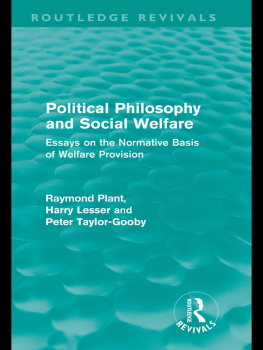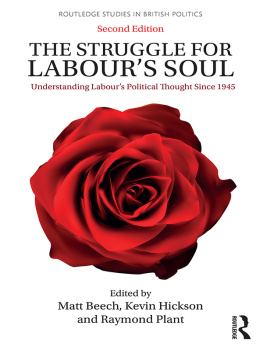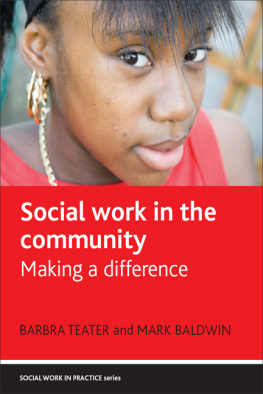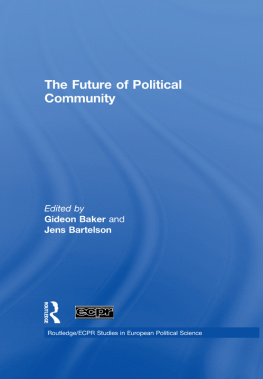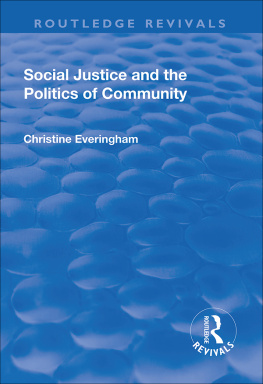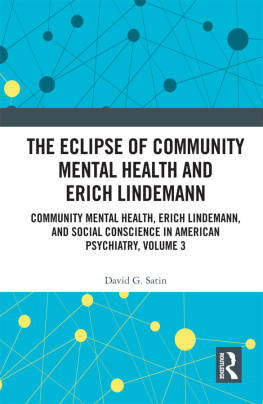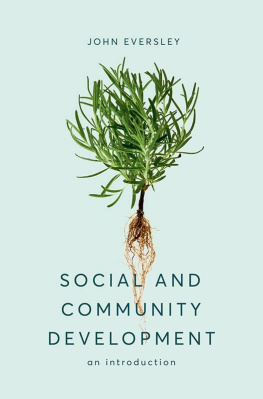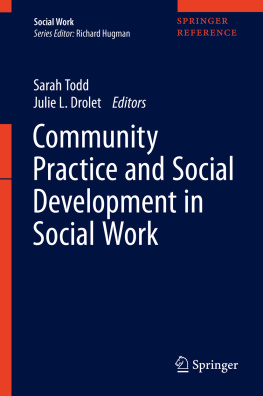
Routledge Revivals
Community and Ideology
Initially published in 1974, this is a work of applied social and political philosophy which relates the philosophical analysis to various forms of community work theory and practice. Raymond Plant emphasizes that community has a wide range of both descriptive meanings and evaluative connotations, linking this dual role of the word in the description and evaluation of social experience to its history in ideological confrontations. The book takes account of some liberal criticisms of the community ideal, and finally seeks to re-state a theory of community compatible with a liberal ideology.
Community and Ideology
An Essay in Applied Social Philosophy
Raymond Plant
First published in 1974
by Routledge and Kegan Paul Ltd
This edition first published in 2010 by Routledge
2 Park Square, Milton Park, Abingdon, Oxon, OX14 4RN
Simultaneously published in the USA and Canada
by Routledge
270 Madison Avenue, New York, NY 10016
Routledge is an imprint of the Taylor & Francis Group, an informa business
This edition published in the Taylor & Francis e-Library, 2009.
To purchase your own copy of this or any of Taylor & Francis or Routledges collection of thousands of eBooks please go to www.eBookstore.tandf.co.uk.
1974 Raymond Plant
All rights reserved. No part of this book may be reprinted or reproduced or utilised in any form or by any electronic, mechanical, or other means, now known or hereafter invented, including photocopying and recording, or in any information storage or retrieval system, without permission in writing from the publishers.
Publishers Note
The publisher has gone to great lengths to ensure the quality of this reprint but points out that some imperfections in the original copies may be apparent.
Disclaimer
The publisher has made every effort to trace copyright holders and welcomes correspondence from those they have been unable to contact.
ISBN 13: 978-0-415-55768-9 (hbk)
ISBN 13: 978-0-203-09234-7 (ebk)
ISBN 10: 0-415-55768-2 (hbk)
ISBN 10: 0-203-09234-1 (ebk)
Community and ideology
an essay in applied social philosophy
The International Library of Welfare and Philosophy
General Editors
Professor Noel Timms
School of Applied Social Studies,
University of Bradford
David Watson
Department of Moral Philosophy,
University of Glasgow
Community and ideology
an essay in applied social philosophy
Raymond Plant
Department of Philosophy,
University of Manchester

Routledge & Kegan Paul
London and Boston
First published in 1974
by Routledge & Kegan Paul Ltd
Broadway House, 6874 Carter Lane,
London EC4V 5EL and
9 Park Street,
Boston, Mass. 02108, USA
Raymond Plant 1974
No part of this book may be reproduced in
any form without permission from the
publisher, except for the quotation of brief
passages in criticism
ISBN 0 7100 7856 0 (c)
ISBN 0 7100 7857 9 (p)
Library of Congress Catalog Card No. 7475859
For my parents
Preface
This book is concerned with an analysis of community as a social and political ideal but it differs somewhat from the usual essay in conceptual analysis because it is concerned with community primarily as it enters into community work, organisation and development. It is thus an attempt at applied social philosophy. My use of the notion of ideology in the essay is very much indebted to an article, Fact, value and ideology, by A.Montefiore in British Analytical Philosophy edited by B.Williams and A.Montefiore, and to the overall inspiration of Stuart Hampshires Thought and Action. I should like to thank the editors of this series for their help, and in particular my thanks are due to Professor Noel Timms who in 1969 supported my first venture in this field with his decision to include my Social and Moral Theory in Casework in his Library of Social Work.
Philosophy and social work may not appear on the face of it to have much in common, but earlier in this century they had close contact through the work of the Idealists, and I have to thank Professor Michael Oakeshott for reminding me of this during the course of a Ph.D. oral (on another different subject). I hope, in the not too distant future, to examine these connexions as they appear in the writings of Bosanquet, Green, Jones, Hetherington, etc.
As usual my thanks are due to my wife and children for bearing with my preoccupations and to my friend and colleague, Dr Geraint Parry, for many conversations on the topic of community.
R.P.
There are some concepts which are permanently and essentially subject to question and revision, in the sense that the criteria of their application are always in dispute and are recognised to be at all times questionable.
Stuart Hampshire, Thought and Action
Philosophy and community work
Rootlessness is by far the most dangerous disease of society.
Simone Weil, The Need for Roots
Community is crucial to our social and political understanding but, at the same time, it is an elusive concept defying attempts at clear cut analysis. This has not, however, prevented community from becoming something of a vogue word in social description at the present time: community action; community politics; community studies; community organisation; community development; community school; community church; community mental health and even community television are all part of contemporary sociological, educational, theological and political thought and experience. In all of these areas of study and action the elusive concept of community defines and specifies the thought and the activity in question.
At the same time terms which are usually taken to stand at the opposite pole to that of community, with its emphasis upon rootedness, cohesion and belonging, are part of the stock in trade of cultural Jeremiahs on both the left and the right: alienation; estrangement; anomie; rootlessness; loss of attachment are all, we are so often told, part of the crisis of modern mass society. Salvation and redemption are to be found in community; but what is it?
In this book we shall be concerned with the notion of community primarily in so far as it is related to community work, community development and community organisation. At the same time, the concept of community which specifies and individuates community work from other social work activities does not exist in an isolated and dislocated fashion, independent of the perspectives which we have on community elsewhere. Indeed, however far fetched it may seem at this juncture, it will be part of the thesis of this book that the notion of community used in these social work contexts in fact has its roots in a disposition of thought about society which originated at the


